| Srl | Item |
| 1 |
ID:
123650
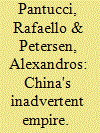

|
|
|
|
|
| Publication |
2012.
|
| Summary/Abstract |
PRESIDENT OBAMA'S late 2011 announcement of his administration's pivot to Asia marked a sea change in America's geopolitical posture away from Europe and the Middle East to Asia and the Pacific Rim. Reflecting the growing strategic repercussions of China's rise, the move presages a new era of great-power politics as the United States and China compete in Pacific waters. But is the United States looking in the right place?
|
|
|
|
|
|
|
|
|
|
|
|
|
|
|
|
| 2 |
ID:
118760
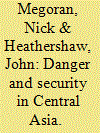

|
|
|
| 3 |
ID:
138948
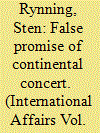

|
|
|
|
|
| Summary/Abstract |
The war in Ukraine is revelatory of a malaise in Europe's security order created by Russia's resistance to western institutions on the one hand and the western desire to maintain these institutions while partnering with Russia on the other. Absent a sense of priorities, western policy risks contributing to the erosion of Europe's security order that Russia seeks in opposition to western ambition. Europe's order is premised first and foremost on a distinctively western concert of nations—whereby Euro-Atlantic states coordinate policy according to a common purpose layered into both NATO and the EU—that forms part of a wider balance of power between Russia and the West. Western policy should aim to strengthen the concert and clarify the balance. However, the prevalent desire to include Russia in the concert confuses matters in a major way, eroding both the underlying sense of priorities and the foundation for order. This article examines this threatening erosion and traces it to three underlying trends: political contestation with regard to the meaning of ‘restoration’ post-1989; military instability following from the unpredictability of ‘hybrid war’; and moral equivocation on the part of the West when it comes to defending the Euro-Atlantic security order. The article concludes that given the depth of contestation, western allies should learn to distinguish concert from balance and act on the condition that the former, a vibrant western concert, is a precondition for the latter, a manageable continental balance.
|
|
|
|
|
|
|
|
|
|
|
|
|
|
|
|
| 4 |
ID:
150554
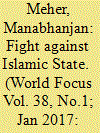

|
|
|
|
|
| Summary/Abstract |
Terrorism does not recognize borders and takes more and more inhuman forms spreading over new areas. Fight against international terrorism is one of the important national and foreign policy issue for Russia. The Russian Federation has been in the very center of the fight against this evil for the last two decades. On various occasion the policy makers in Russia stressed a ‘compressive approach’ associated with improvement of socio-economic conditions of the people to deal the terrorism.
|
|
|
|
|
|
|
|
|
|
|
|
|
|
|
|
| 5 |
ID:
133263
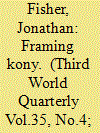

|
|
|
|
|
| Publication |
2014.
|
| Summary/Abstract |
This article explores the influence of actors and organisations outside the corridors of power in Washington, DC on US 'crisis foreign policy making' in Africa. Focusing on the case of US policy towards the lra/northern Uganda crisis - particularly the Obama administration's 2011 decision to send 'combat-equipped US forces' to pursue the rebel group across central Africa - it is argued that the role of African governments themselves merits greater consideration. The decision to send in these 'military advisers' was arguably strongly influenced by campaigns run by Western policy institutes, notably the International Crisis Group, and US advocacy groups since around 2007. The Ugandan regime of Yoweri Museveni has - it is suggested - nevertheless itself fundamentally shaped the nature and direction of the debate into which such groups have entered. This raises crucial questions about the agency of African governments in Western 'crisis' decision-making fora.
|
|
|
|
|
|
|
|
|
|
|
|
|
|
|
|
| 6 |
ID:
124380
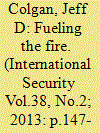

|
|
|
|
|
| Publication |
2013.
|
| Summary/Abstract |
What role does oil play in international security? While the threat of "resource wars" over possession of oil reserves is often exaggerated, the sum total of the political effects generated by the oil industry makes it a leading cause of war. Between one-quarter and one-half of interstate wars since 1973 have been connected to one or more oil-related causal mechanisms. Eight distinct mechanisms exist: resource wars, in which states try to acquire oil reserves by force; petro-aggression, whereby oil facilitates domestic political control of aggressive leaders such as Saddam Hussein or Ayatollah Ruhollah Khomeini; externalization of civil wars in petrostates; financing for insurgencies, such as Iranian oil money to Hezbollah; conflicts over potential oil-market domination, such as the United States' conflict with Iraq over Kuwait in 1991; control over transit routes, such as shipping lanes and pipelines; oil-related grievances, whereby the presence of foreign workers in petrostates helps extremist groups such as al-Qaida recruit locals; and as an obstacle to multilateral cooperation, such as when an importer curries favor with a petrostate to prevent multilateral cooperation on security issues. Understanding these mechanisms can help policymakers design grand strategy and allocate military resources
|
|
|
|
|
|
|
|
|
|
|
|
|
|
|
|
| 7 |
ID:
120460
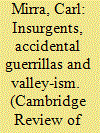

|
|
|
|
|
| Publication |
2013.
|
| Summary/Abstract |
In recent years Western policy towards Afghanistan has been marked by inconsistencies and errors. This article explores United States (US) soldiers' perceptions of the enemy in Afghanistan based on oral history interviews with dissenting combat soldiers who served in the Afghan theatre. By foregrounding soldiers' attitudes towards the enemy, this study includes marginalized voices, often overlooked, that challenge prevailing misconceptions. General David Petraeus, the former commander of US forces in Afghanistan, has argued that significant battlefield decisions are not reserved for generals alone. Petraeus' counterinsurgency programme promotes 'strategic corporals' whose decisions hold important consequences. If strategic corporals are involved in military decision-making, it follows that their interpretation of the conflict may also hold strategic implications for the researcher. Soldiers' views of war are not the final, authoritative verdict. However, this article suggests that these strategic corporals should be included in a complex matrix of interpretation to broaden US understanding of the enemy.
|
|
|
|
|
|
|
|
|
|
|
|
|
|
|
|
| 8 |
ID:
153984
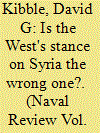

|
|
|
| 9 |
ID:
115192
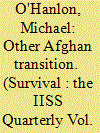

|
|
|
|
|
| Publication |
2012.
|
| Summary/Abstract |
Afghanistan policy debates in NATO capitals these days are about transition. Specifically, by 2014, the NATO-run International Security Assistance Force (ISAF) operation is to end, according to a schedule first proposed by President Hamid Karzai of Afghanistan and later reaffirmed by outside powers at NATO's Lisbon Summit in 2010. By that point, Afghans will have primary security responsibility for all parts of their country - a goal that they will technically reach in 2013, according to the latest plans - and nearly all ISAF troops will be able to depart. The May 2012 strategic partnership agreement between the United States and Afghanistan, reinforced by several other such bilateral accords, will guide relations thereafter; the July 2012 Tokyo donors' conference has added further detail to plans. With these pieces in place, Western policy debates tend to dwell on how fast to bring troops home between now and the end of 2014.
|
|
|
|
|
|
|
|
|
|
|
|
|
|
|
|
| 10 |
ID:
084658
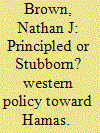

|
|
|
| 11 |
ID:
139516
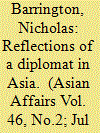

|
|
|
|
|
| Summary/Abstract |
Sir Nicholas Barrington served in a number of Asian postings throughout a 40-year career with the British Foreign Office. In this article, he reflects on his experiences as a diplomat in Iran pre- and post-1979 Revolution, Afghanistan, and finally as High Commissioner to Pakistan, with observations on Benazir Bhutto and General Pervez Musharraf. He concludes with an independent and critical discussion of western policy towards the Middle East and South and Central Asia, and the rise of Islamic State.
|
|
|
|
|
|
|
|
|
|
|
|
|
|
|
|
| 12 |
ID:
104765
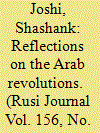

|
|
|
|
|
| Publication |
2011.
|
| Summary/Abstract |
We are witnessing a series of revolutions and uprisings of a pace, connectivity and breadth for which the only parallel in modern history is 1989. But these aspirant and actual revolutions are incomplete, uneven and unpredictable. Shashank Joshi argues that long-held assumptions about the Western trilemma in the Middle East - the choice between democracy, stability and pro-Western foreign policy - must now be urgently re-evaluated.
|
|
|
|
|
|
|
|
|
|
|
|
|
|
|
|
| 13 |
ID:
130210
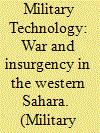

|
|
|
| 14 |
ID:
108178
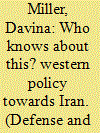

|
|
|